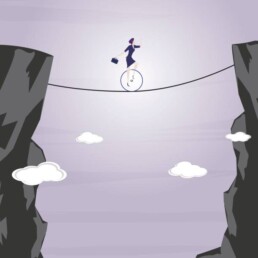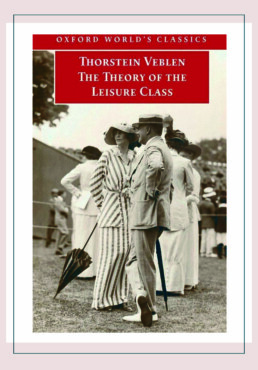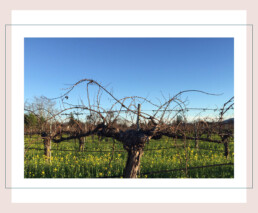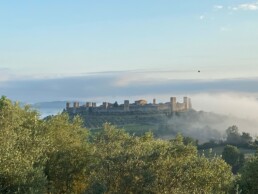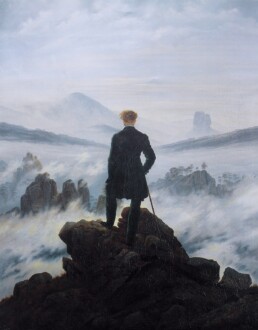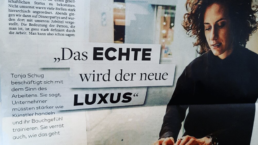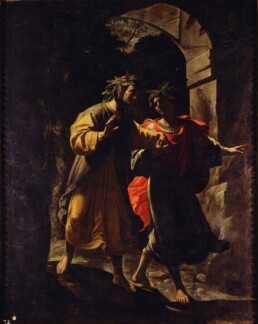Letter of Inspiration #15 - Happily-ever-after

This Letter of Inspiration will explore what a CEO or HR manager can learn from fairy tales and Buddhist economics.
Happily-ever-after
Have you ever wondered why the happy ending in fairy tales is always the wedding of the main characters? Usually this couple have fought their way through great challenges in order to ultimately be together. In The Beauty and the Beast, a young lady is abducted to live with a beast, a creature that has been bewitched and lost its human form. Of course, only the magic of true love can break this spell. We can all guess what follows: an overjoyed couple who marry and live happily ever after.
This is only one example of many. But what about real life after the big day? The only thing the fairy tale authors tell us about the “after” is that it was always happy. Cinderella, Beauty and the Beast, Aladdin – all these stories stop abruptly after the wedding, at the point of peak infatuation. That’s as far as it goes dramaturgically, with the statement “they lived happily ever after”; not from climax to climax, but in a continuous linear fashion.
What does that look like in reality? Much of the infatuation phase can also be found in customer and business relationships. At the beginning, it's exciting, new, uncertain, interesting, but once the two parties commit, it gets serious. There is hardly any turning back after the “I do” (signing the employment contract, starting a new business relationship, etc.) and expectations are high. How do you manage to fulfill these expectations from the infatuation phase in everyday business life? Can the charm of the unknown also be transferred to this second phase? We find few answers to this in fairy tales. So let's take a look at the real world.
Before getting married, we have to realize that we first have to find the right partner. If you look at the statistics, you can see that 60 to 80% of M&A (mergers & acquisitions) deals fail. Once someone is hired, the turnover rate in Germany in retail, real estate, education and training is currently between 30 and 40 %. This means that just under one in two relationships are dissolved. What are the reasons for this?
The probability of finding and keeping the right (business) partner, customer or employee is therefore a great challenge, perhaps comparable to that in the beginning of a fairy tale: the beast wants to win over the beauty. What is the secret to success in these positive examples? Finding the magic of seduction even in the familiar. In Darwin's second theory of evolution, it is not the adaptor (as in the first theory), but the aesthete who wins.
Under theories of evolutionary aesthetics, the assumption is that the basic aesthetic preferences of Homo sapiens have evolved to improve their successful survival and reproduction. Darwin points to our desire for variety. For me, this is a possible key to a happily-ever-after with highlights and without linearity. The seduction lies in the variety that can also be offered in the familiar.
Whether we are talking about relationships with employees, customers or business partners, sameness and repetition is a killer. Let's get creative and think about what we can do to stand out from the sea of monotony. The key word is individuality. Working models adapted to the individual employee and their starting position. Projects that are tailored to the customer’s needs instead of a copy/paste approach. Genuine inspiration, like that of an artist. And I’m sure that every now and then your wife or husband would also enjoy a change from the standard bouquet of flowers for Valentine's Day.
What has inspired me recently? Buddhist economy.
I stumbled across the term “Buddhist Economics” (drawing on the book Small is Beautiful, by German economist K.F. Schumacher), which emphasizes the well-being of all members and of the environment rather than the pursuit of infinite growth and profit.
Buddhist economics sees the function of work as activating and developing one's abilities, letting go of the ego and the corporation, and creating goods and services for a better (happier) existence. Instead of using consumption as an indicator of standard of living, this form of economics values optimal consumption paired with the least effort, so that our energy can be directed towards other creative endeavors.
To me, this sounds very much like an approach that will appeal to future generations, and one that every HR department and management team will have to address. Examples of implications for companies and entrepreneurs might be:
- Implementing a pay system based on the skills and contributions of each employee
- Promote a corporate culture that encourages employees to see their work as a contribution to the common good rather than just a source of income
- Maintain open and supportive communication where every employee can contribute and where decisions are based on the consensus of those involved
- Invest a portion of profits in social or cultural projects and charitable causes to help improve or educate the community
A Buddhist economy also has similarities with my fairy tale example, above. It is about being actively involved and focusing on the common good, not just on one’s self. What does “it” (the whole) need in order to continue? Where can I make a contribution that goes beyond simply satisfying needs? Some of you may remember the Christmas story of little Lord Fauntleroy: a little boy who unconditionally puts the good of the community at the center of everything he does, and whose infectious joy ends up transforming his old and grumpy grandfather.
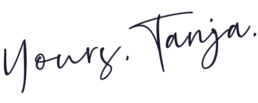
Share
Letter of Inspiration #14 - Trust

I'm excited to take you on a journey about trust today. In addition, you find my current thoughts on the topic of luxury, developed in preparation for a keynote in Hanover this week. Have fun diving in.
A higher good: trust.
An ordinary Monday morning: I'm going through my emails and stumble across the automatically generated LinkedIn job recommendations that have suddenly raised my interest. Not because I'm looking for a job, but rather because the jobs posted remind me of Black Mirror – a Netflix series that depicts future scenarios, sometimes very dramatically.
The job titles I see are completely new to me – “Culture and Well-being Manager”, “Community and Relations Specialist”, and “Head of Customer Engagement” – and I was curious to read up on their meaning and function. They seem to point to a new attempt to focus on people, i.e. employees and customers. What’s exciting here is that the job offers didn’t come from major tech companies like Google or Apple, players where one expects the employee will play a central role. No, I'm talking about long-established corporations, international consultancies and SMEs (small and mid-sized companies). What’s happening? Are turnover rates out of control? Have people realized how essential employees are for the success of a company, or how difficult it is to find new ones?
The current job market is a reaction to what has become apparent in companies, especially during the pandemic. Relationships need focus and ongoing care. If your husband/wife received a newsletter once a year with the latest update, your relationship would probably be somewhere else today. Attention, personal words – something real: that’s what people (including employees and customers) are looking for. As we can learn from partnerships, building and maintaining a relationship is an ongoing process, it cannot be achieved by making a few isolated gestures.
Two years of pandemic have left their mark. During this time, we all not only hoped that normal would return, but also questioned our “normal”. Any (customer or employee) relationships that were not strong enough broke down because of this very questioning. The task these new managers now have is an almost impossible discipline as they battle fundamental doubts about existing concepts. Culture managers and customer engagement managers are being asked to rebuild trust where it has been lost, or never existed. Regaining trust or laying the foundation for it – something else we know from personal experience – is a process that takes time.
A Management Matter
Loyalty, self-responsibility, active thinking and thus creating added value for the company all form the basis of an entrepreneur’s trust in his employees. A culture manager alone cannot achieve this; it must be viewed more holistically. The necessary framework can only come from the entrepreneur or CEO himself. The well-intentioned new hires need clarity about the entrepreneur's attitude in order to function. A clear attitude is one that describes the entrepreneurial spirit in its depth, it is the unconscious feeling that guides an entrepreneur, and this is precisely what needs to be put into words.
With this in mind, the idea for Zero Senses was born four years ago. We work with entrepreneurs and leaders to verbalize their attitude and accompany them in creating ways and structures to express this approach. How can intuitive entrepreneurship be verbalized and thus shared with partners, customers and employees? This will be the basic prerequisite for the aforementioned new hires.
It is obvious that the entrepreneurial attitude cannot be identified overnight and implemented internally. Short-term solutions don’t work – this is about depth. Style cannot be developed overnight. A stylish home doesn’t look like something in a furniture catalog. Pieces of furniture need history and not just the same purchase date. Style is developed over time, just like a clear attitude.
What has inspired me recently? Exaggeration.
People like to talk about material and immaterial luxury. The former is understood as loud status luxury, which immediately triggers images of fast cars, luxury yachts and other consumer goods outside the normal standard of living. This luxury is clearly associated with exaggeration. The quiet - immaterial - luxury, on the other hand, is associated with tranquility, self-determination and reduction. One might think is the very opposite of luxury. However, in extreme cases, exaggeration can also be found in this type of luxury, such as when a multimillionaire “brags” about being such a minimalist as to possess only 64 things, or the essence of a lavishly laid dessert buffet is suddenly found in foams and essences in the dessert bowl of a Michelin-starred restaurant. That being said, we also find exaggerations in immaterial luxury, namely in that of compulsive minimalism. For me, this results in a new definition: luxury means exaggeration (in whatever form). And exactly this triggered my thoughts for a new form of luxury. To be continued.
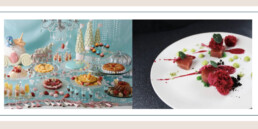

Share
Letter of Inspiration #13 - Loss of high standards

Holidays in general, and especially those at the end of the year, invite us to look back. In addition to thoughts on the highlights and the not-so-good moments, I asked myself at the end of 2021 what impact the new normal has had on our habits.
Loss of high standards
Our everyday life has changed dramatically. We are once again encouraged to work from home, and anything involving in-person interactions requires the constant monitoring of possible changes to the current situation. In addition, long-planned events or meetings may end up being cancelled or adjusted at the last second, making our improvisation skills more in demand than ever. Only those who stay permanently in motion manage not to get lost in memories of the good old days of a pandemic-free world.
All this effort seems to take away our energy for aspirations and kindness. Emails are getting shorter and responses take longer, while both salutations and greetings in messages are disappearing. Suddenly you see men who used to walk across Zurich’s Paradeplatz in elegant suits in sporting jeans and turtlenecks. Restaurants in the Old Town, where you used have to fight for a seat at lunch, now have free tables even on the same day. And everyone has redefined their dress code – as evidenced by the revival of jogging suits.
Meanwhile, the construction industry is enjoying a surge in demand. If you spend your days at home online and in Zoom meetings, you at least want to feel comfortable in your own bubble. Our move into the digital world makes us forget our standards from the (old) reality. Christmas cards that used to be signed by hand were sent via WhatsApp this year, if at all. It seems as if many are asking themselves: what’s the point? Has the pandemic helped usher in a new age with new rules of style and decorum? Have we become kinder to ourselves and forgiven ourselves for no longer following the yoga or workout app every morning? Have we learned that it’s nice to spend time with the people who are close to us instead of travelling the world to pursue others or grandiose goals? And has this led us to start redefining success? The ideals of “faster, higher, stronger” seems to matter less to us – and they are also less tangible online. But what then is important to us in this new phase?
People are always looking for what they cannot have. The spontaneity now frequently imposed on us may lead us to desire permanence: this can be in the form of a place to live, familiar products or stability in our personal environment (work, family, partner, and friends).
The question we should address now at the beginning of 2022 is: how can entrepreneurs give their employees and customers this consistency?
What has (not) inspired me recently? Boredom.
People who used to be able to tell stories about their latest trips or business meetings now talk about the baker who makes the best sourdough bread or the latest Netflix series. Conversations have become boring, because nothing happens anymore. As we have become poorer in experiences, our lives have lost a bit of their meaning.
“In a society that is used to making such comparisons, success that is visible to all becomes the basis of prestige and an end in itself. One demonstrates one’s own achievement in order to gain prestige and escape contempt.” (Thorstein Veblen, The Theory of the Leisure Class).
After two years of the pandemic, we have lost our habits of having social interactions and conversations, which, according to Thorstein Veblen, a 19th century economist who was one of the first to reflect on consumerism, leads to the conclusion that we are losing our social status. The only consolation is that if everyone feels this way, our status symbols may soon be redefined.
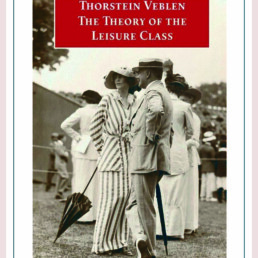

Share
Letter of Inspiration #12 - Clarity

In this Letter of Inspiration, I use Milan Kundera's work "The Unbearable Lightness of Being" to illustrate the difficulty of making clear decisions. In addition, I was inspired by the view of viticulture. —an industry which can be a true role model when it comes to the topic of patience, as it must work within the limits imposed by nature.
Clarity in business decisions
One of the main characters in Kundera’s famous book is Tereza, a woman marked by self-doubt who describes in a dream her fear of not being enough. She dreams that her husband, Tomas, a philosopher who enjoys life, sends her to Petřín Hill in Prague, where a man with a gun is helping three suicides kill themselves. When the armed gentleman turns to her, she cries out, “It was not my choice!” and is granted permission to leave. Only at the moment when it is literally a matter of life and death does Tereza take responsibility for herself and make a decision. Why is it so difficult to make clear decisions?
It starts with the sheer volume of possibilities we are offered. The routine walk to the café around the corner in the morning becomes an interrogation game: Flat white? Small or large? What kind of milk? Cash or card? This drags on into the meetings that follow, where future investment decisions, hiring or corporate strategies are discussed. There is no shortage of options or opinions; in fact, there are too many. The trick is to figure out how you like your coffee—what you actually want.
The goal here is not perfection. We are not machines, nor can a decision be made with the gift of perfection, like that of the master forger Beltracchi. Clarity about what you don’t like is a good first step. “It was not my choice!” cries out Tereza—I don't want to die. Although this was a dream, by taking it a bit further, one can imagine that this decision on Petřín Hill brought further consequences. Because the moment of clarity has an incredibly liberating energy. Most of the time, this clarity has been present in us for a long time, nevertheless we tend to hesitate. There are many reasons for this: not yet being ready for the consequences that come with it, being afraid of change and letting go of the familiar, or (still) lacking the words to express it. One thing you should be aware of is that life is not static, but in a constant state of flux. Whether you decide consciously or choose the strategy of waiting, life keeps flowing. The greatest security is found in trusting continuous movement.
Looking back at the past, none of my decisions have ever brought anything bad. Change, yes, but that’s what happens when you move. The context changes, and a trained intuition is a tool that gives support and clarity in a state of continuous movement. I will be speaking on how this can be trained on October 27 at a lecture at the Senior Management Program of the University of St. Gallen. Details will be available on the website afterwards.
In Globalance Bank’s Zukunftsbeweger magazine, I wrote about stability in motion in my latest column. Click here to read the article.
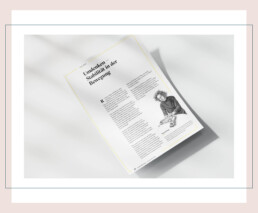
What has inspired me recently? Patience.
The last vineyards have just been harvested and the main work in the cellar has been completed. Now it is time to wait, because working with nature does not allow for short-term adjustments, nor can the harvest be repeated or mistakes corrected. There is a dependence and with it a hope that nature has been kind to the winegrowers. After all, there will not be another chance until next year. Nature sets the pace and we have to follow.
What this example shows me is not only the dependence on external influencing factors (because they exist everywhere), but also the level of clarity it takes to produce this precious product. For example, do I want an elegant, lean wine with low alcohol that tastes more like dark berries or even tobacco, or something completely different? What framework (cultivation, aging and production) does it take for me to succeed? And even if I can visualize and express all this, I still have to wait to see if my strategy has worked, because the finished result will only be revealed in the bottle.
Patience is a quality that is often lost in the business world, where I have been conditioned to believe that thoughts should be implemented immediately. Silicon Valley tells us we should “fail fast”. But is that the case? Don’t good ideas, just like good wines, need time to mature in order to develop their full potential? This is certainly true in wine, and I think it’s true in business as well.
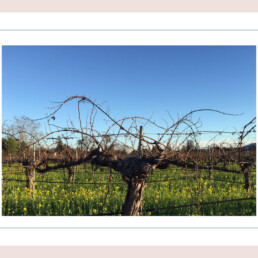
Summer is now noticeably over and the dark and cool months have begun, ushering in a time for reflection and debate. May this Letter of Inspiration encourage you to do so and initiate new thoughts!

Share
#11 Letter of Inspiration - The Escape to Safety

In this Letter of Inspiration, I would like to share my thesis of why the post-pandemic has left us feeling lethargic and how this connects with how we humans prefer to take the easy way. Besides thoughts on the escape to safety, I write about my new insight into how depth dissolves context. Enjoy!
The Escape to Safety
The post-pandemic reactions are different than expected. In almost every conversation, I hear about resignation, motivational difficulties, and signs of exhaustion. Not just in the big consultancies, where hires and fires are common, but everywhere. It doesn’t seem as if everyone was waiting for things to get going again. Instead, drive is restrained. In fact, I even observe a tendency to escape, to flee from the known. This is most likely because we have been through a time in which parameters, both private and professional, have been challenged, thus also calling into question the status quo. Now you might think: a good thing that it has! After all, so much passed us by too carelessly – climate change, digitalization, AI, and so on. It seems as though everything happened at the same time, giving us almost no chance to think about these topics, let alone develop a clear position on them.
The changing frameworks of the last months have offered an opportunity to reflect on the big questions of life. One might assume that the increased fluctuation rates are an indication that people are (finally) pursuing their needs, desires and – yes – perhaps their dreams. There was a moment of enlightenment, and thus clarity, about what we actually want.
But instead of the pursuit of ideals, I hear rather the opposite in conversations – very few are following their true calling. Instead, they are taking the path of safety. The personable waiter becomes a call center agent, the former architect looks for a job in administration, while the entrepreneur again chooses the apparent security offered by a corporate job.
What surprises me about this is that I don‘t believe that this step is the result of honest self-reflection, but rather the most obvious, simple or logical solution for something that, if dealt with further, would only become exhausting. This, in turn, makes me critically question how sustainable these newly chosen paths are. Will a second wave follow in a year’s time – not a wave of the coronavirus, but one that raises the question of meaning again?
Step in front of the mirror
As humans, we are hardwired to take the easiest way. This is why, in the supermarket, we usually wait in the longest line, because who knows, something could be wrong with the other ones. A queue of several people already waiting seems to be right – they couldn’t all be wrong, could they? This pattern can also be seen in parks, where paths emerge over time as people repeatedly take the same shortcuts. It seems logical to follow the way that others have already marked out, so that we don’t have to do any extra thinking or walking. My fear, however, is that we may be transferring this pattern to our life choices.
After all, wouldn’t it be worth taking a few extra steps or engaging in deeper thoughts, especially when it comes to one’s future? Albeit grappling with the question of “what you really want” is not easy, I am nevertheless convinced it is one worth asking. Especially in times of uncertainty, that which seems logical is not necessarily the right thing to do. We must not lose the bigger vision now, but should instead take the time to reflect and create within this change. New thoughts, an adapted lifestyle, a new job – yes to all of that! But please: make sure it is based on your own wishes and needs, and not driven by a hope of finding security. If this pandemic has shown us anything, it is that nothing is certain. However, if we can summon up confidence in ourselves, that will be our most important tool for the coming months and years.
For more on how to use and develop this skill, Zero Senses will be offering the “Cultivating Presence” retreat from October 21st–23rd of this year. If you are currently looking for new impulses and inspiration, reserve your spot now:
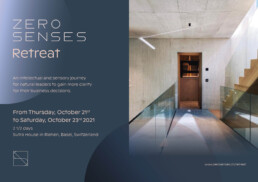
What has inspired me recently? Depth dissolves context.
I recently found myself in an environment that I never would have chosen for myself: crumbling walls, a bed that was just a mattress on the floor, and a level of cleanliness well below Swiss standards. And yet, the week I spent there was one of the best I’ve had in a long time. Why was that so?
The artist James Turrell once said in an interview, “home is where my community is”. For this space and light artist, home has no meaning in the geographical sense; it can be wherever he feels a deep connection with his surroundings. This became very clear to me in my example. The group of people and the depth of the connections between them render the context irrelevant. My thesis is that the stronger the relationship, the less context matters.
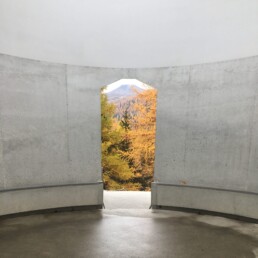
On a personal note...
Recently, an article of mine was published in the SMAC Magazine on "The Good Life" – a topic quite fitting for this Letter of Inspiration.
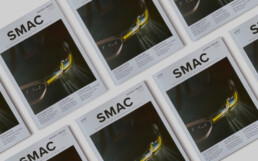

Share
#10 Letter of Inspiration - Loneliness

It has probably been a long time since there has been so much discussion about feeling lonely as there has been in recent months. Can enduring this void even be something positive that strengthens our characters? Find my thoughts on the topic of loneliness in this 10th issue of my Letter of Inspiration, along with a freshly published article in the Handelszeitung as well a podcast interview about intuition and leadership. Enjoy!
Loneliness
Being alone is not something that comes naturally to us. This is no empty phrase, as anyone who has ever dared to go on vacation or to a restaurant alone will know. The first moment feels strange, unfamiliar, maybe even unnecessary and wrong. I get that. But didn’t sitting on a bike for the first time, and riding off without training wheels, having your Dad running alongside then slowly letting go, feel strange too? The moment of “flying” alone is what scares us, but at the same time it opens up a new world. Suddenly we are - in the cycling analogy - more independent, more flexible, and we get from A to B faster.
The moment of overcoming uncertainty or fear is like a software update. The only difference is that to reach the next level, we have to make a conscious decision to move rather than just press a button. Our development does not just happen, we are forced to make an active decision. And then, of course, there are distractions: life, whether pleasant or not, but certainly familiar, with friends, colleagues, family, shared jokes, and fun in the routine of social obligations and pleasures. There is something seductively distracting about pleasure, consumption and community.
Very much like the next iOS update, being alone (personal development) never fits into the daily routine. There is no time for a back-up or we don’t have the PIN at hand. There are countless reasons to click "remind me later". However, the real driver may be an avoidance of that brief moment of void (uncertainty/not knowing what is happening) that occurs when we do something outside of our routine.
When you think about the moments that shaped you, experiences always come to mind - at least for me - of times when I also dared to do something. Walking into a meeting where I already know the outcome or going on the annual family vacation in Italy doesn’t especially add to my development scale. The belief that we are not alone when we are with others is a fallacy we like to tell ourselves. The fact is that we make decisions alone, over and over again. We also bear their consequences or fruits alone - e.g. getting from A to B faster.
Distraction and perseverance
Arthur Schopenhauer, a German philosopher, already summarized the dilemma of mankind in the 19th century when he described humans as porcupines: If we get too close to each other, we risk hurting ourselves, but if we keep too great a distance, we risk coldness and loneliness.
"Thus the need of society (...) drives men to each other; but their many repugnant qualities and intolerable faults repel them from each other again. (...) But he who has much inner warmth of his own prefers to stay away from society, so as not to give complaint, nor to receive it."
Couldn't solitude be something beautiful? Indulging in one's own thoughts? Attending a dinner where you are not distracted by conversation or an appealing counterpart, but are allowed to enjoy and experience it alone, focused with all your senses? As with everything in life, it's all about balance. What I take away from this thought is to let the balance arise by daring again. Dare to allow and enjoy the moment of being alone and using your senses consciously. It will unfold in an update in our business decisions.
What has inspired me recently?
Gerhard Richter - Landscapes.
Richter is considered one of the most important living artists. His current exhibition Landscapes at the Kunsthaus Zurich features works from 1963 to 2018. There is so much that you can learn about your daily existence and work from this exceptional artist. Richter thinks that we have an overly perfect image of nature. It is far more than what the camera shows, it is more than what we choose and want to show. It goes beyondthe pure, artificially chosen detail. Just like our lives. It is more complex than some may see or show. The creation process for the expression of its reality works in the interplay: How much is just right? When is it too much? We are always searching for the right balance. How strong can an abstraction of a landscape be while still allowing it to be perceived as a landscape? Which elements of a cityscape are crucial in order for the city to still be recognizable as such?
A nice example for a briefing or meeting: How much should I prescribe so as not to be confronted with the demand of my own perfection at the end, and how much should I say in order to give a framework for development, i.e. independent work, at the end? An example from Richter's exhibition is attached.
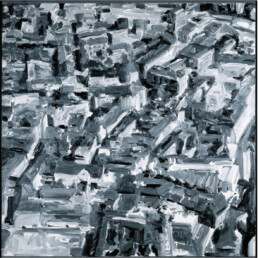
On my own behalf…
The topics of loneliness and attitude have not only been guardrails of my thoughts in this Letter of Inspiration, but are also reflected in my recent article in Handelszeitung.
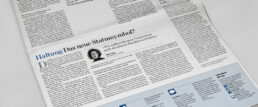
And last but not least, I recommend this podcast interview (in German) for your next car or train ride. Jonathan Sierck, initiator of vonMorgen, asked me a few good questions about intuition and what it has to do with leadership. On Spotify or Apple Podcast
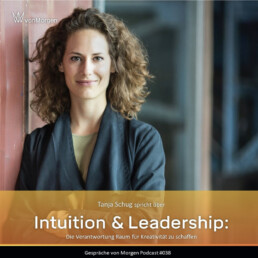
Here an excerpt:
Here an excerpt:
"It is important that we do not decide things from external influences, but rely more on ourselves again, and thus can also make more agile decisions that are not dependent, but strongly driven from ourselves." - Tanja Schug, in conversation on VonMorgen Podcast - Episode 38
With this, my Letter of Inspiration comes to an end… Thank you for joining me on the way to more clarity. If you like this episode, please feel free to share it with like-minded colleagues and friends, encouraging them to subscribe!

Share
#9 Letter of Inspiration - Breaking out of standardization

In this letter you find impulses on the magical endurance of uncertainty, on how to use cultivated intuition to make clear decisions, and on what inspired me recently on the subject of 'sustainability'. Last but not least: you can find the essential thoughts from my speech titled "From Rational to Emotional Thinking", which I gave to 250 managers in Zurich (in German).
Romanticism Today
So 2021 is going to be pink and cheesy? Not really, because the original meaning of romanticism has nothing to do with big red hearts and public marriage proposals. In the 19th century, Romanticism was an artistic outcry to break out from the chains of standardization. This was manifested above all by the desire for individuality, as a reaction to the industrialization of the time. This movement became palpable through abundant drama. In the visual arts, the eerie, the subconscious, the fantastic, the passionate, the individual, the emotional and the adventurous established themselves as central motifs, which were intended to break and expand the boundaries of the intellect and were directed against mere utilitarian thinking as well as industrialization. The intensive use of color is a salient feature of the romantic painters, seen for example in intense and dramatic sunrises, almost too beautiful to be true, or in one of the most famous paintings of this era: "The Wanderer above the Sea of Fog". This was how Caspar David Friedrichs represented the situation of the artist - the tormented genius, standing on the mountaintop and, at the same time, on the edge of existence, symbolized here by an abyss. Although a thick fog blocks the view, there is a suggestion of ultimate hope. This era created motifs that still awaken longings to this day. After a special year like 2020, which raised fundamental issues and made us question the status quo, certain voices of longing also become louder. One suddenly longs for the beautiful, the real, as well as for more profundity, and for that which gives one support and stability.
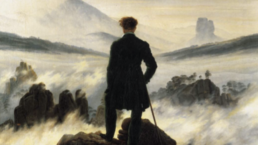
The “self” becomes important
An increased search for meaning has been observed as a trend for some time, and not just among the younger generation. At job interviews, applicants ask about the company's values and show interest in its social and societal responsibility. After all, today there is much more to a job than the accompanying title or the role it requires you to fulfil. It's about having a clear attitude, and that attitude has to match your own convictions. To start with, this requires clarity about oneself. In the medium term, it also leads to demarcation effects, in the professional and private environments. Living out one's character excludes some people, but also creates a stronger bond of attraction between like-minded people.
The inner call to do something meaningful is also reflected in the continuously increasing number of start-ups: +5.3% in Switzerland from 2019 to 2020, with 2019 already considered a record year. A mentality of creating can be observed. Indeed, these values show a clear trend towards "owning". We can only hypothesize about whether this is because companies may not have the right answers to the question of meaning or whether it is because the desire to break out of the classic career path is becoming greater. What is certain is that in recent years, a high value has been placed on standardization in many areas, because everything that is standardized brings scalability. Oh yes, that wonderful word! Scalability. The ability of the system or company to grow. That a certain parallel to the Romantic era - described above - can be seen here is, I think, an exciting insight. Thus, the increase in the number of new companies is not surprising. But what else could this mean? Three theses:
1. Expression of one's own individuality
The drive to break away from existing thought patterns is also driven by the uncertainty that lies ahead. The question of how my work can make a difference, and for whom, displaces the question of growth and more money. Focusing on your own values also makes you more frugal, because it answers the question of what you really need very honestly. One can observe a peeling off of one's own character, as evidenced by the shrinking closet, or the decluttering of an office or living room: We make ourselves lighter, or we gain profile.
2. Era of the artists
We have lost the ability to deal with uncertainty in our everyday business life. Our last years were more or less plannable, because the really big changes had perhaps been foreshadowed but had not (yet) shown themselves. It still worked out somehow. Now, many industries and thus also many jobs are uncertain, some may disappear and some may never even return. In conversations with artist friends, I often hear, almost jokingly, "That's nothing new for us". Artists are used to coping with uncertainty, and sometimes this feeling can even be a driver of creativity. This attitude prepares us for 2021.
3. The desire for enchantment
We have lost the magic in our interactions. I speak of magic deliberately, because what standardization has also brought is dry and relentless transparency. So much is predictable, and thus we have lost the magic. The gift of creating a magical moment is one that we just had the chance to experience at Christmas through the eyes of children, seeing their irrepressible anticipation of what Santa will bring. How can we manage to rekindle this glow in our eyes as well? This question will be homework for all of us in 2021.
What can these theses mean for the individual?
create and celebrate individual thoughts;
learn to think independently, outside of existing frameworks; and
cultivate the art of creating a context.
How does this work? With self-awareness, in the most literal sense.
What inspired me recently: the power of breaks
The biography of Irvin D. Yalom (arguably one of the most successful psychoanalysts of our time, as well as the author of bestsellers such as "When Nietzsche Wept") never ceased to amaze me as I read it. I found one recurring observation in it particularly intriguing. Yalom - who is 89 years old, married, the father of four adult children, and used to be a professor at Stanford University - would take breaks of up to six months from his daily life each time he devoted himself to a new topic, such as his textbook on group therapy, existential psychotherapy, or one of his many novels. During these breaks, Yalom would travel with his wife Marilyn, who was a professor of French literature. He emphasized several times in his biography how important this change of scenery was in broadening his perspective. There is certainly much to learn from Yalom, but this deceptively simple point can be adopted directly. Creation needs space and time - not only for artists, but also for scientists and entrepreneurs.

On my own behalf…
I am very happy to announce that Neue Zürcher Zeitung (NZZamSonntag) recently ran an article by me about the meaning of work. If you missed it, you can find it online or text me to get a copy.
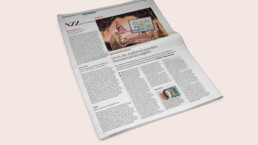
Thank you for joining me for this episode of the Letter of Inspiration! Feel free to share this letter with colleagues and friends.

Share
#8 Letter of Inspiration - Development in times of crisis

In this Letter of Inspiration, you will find thoughts on strategic development in times of crisis, on what lies behind the superficial meaning of beauty, and a radical view in which I describe art as a by-product of personal development. Enjoy!
A fundamental human competence
Many (business) models are based on that which is already known, and use the past as a point of reference in order to assess risk, to make analyses or budget plans for the next year. However, the limits of proven strategies become apparent as soon as unforeseen or first-time events (such as a pandemic) occur. What is needed then is not only the advice of experts, but, even more importantly, one's own intuition, as entrepreneurs reorient and translate an existing company into a new environment.
"Intuition is a fundamental human competence and therefore may well be a component of professional risk management.”
And intuition presents another advantage: Creating new thoughts, ideas and visions from within yourself makes you independent, as inner reflection is autonomous from external influences such as the analyses, habits and assessments of others. Of course it is pleasant to be protected or supported by others or outside factors, but the apparent security they offer is often fleeting and ephemeral. A good example of this is the current pandemic: unforeseeable, but fundamentally impacting all of our (business) lives. A conscious intuition is like a strong core, it gives stability yet freedom to move - hugely important in times of high-risk and change.
Artists, in their creative processes, rely on this inner voice: the intuition. Günther Uecker, a member of the ZERO art movement dedicated to a new beginning for art after the Second World War, described it as follows:
"There is something, and it is not yet expressed in my works, but I know that it is (...). Sometimes I have the feeling that I am close to it, but I do not know what it is (...)."
As Dr. Nikolaus von Bomhard, former Chairman of the Board of Management of Munich Re, once said in a worthwhile FAZ article.
The creative process, whether in art or in business, is not easy. To dare to create something new requires courage, independent thought, and space. In this process, restrictions, predetermined paths and old knowledge act largely as weights chained to your ankle that prevent you from advancing. To free yourself from this ballast - to let go - is the real challenge, but also an opportunity.
A blank canvas
Why should a path that offers neither ease nor a guarantee of success be desirable? The security we find in something familiar is based on the concept of hope. Once the surface of this illusion is broken, it becomes clear that the strategy of hope is neither secure nor sustainable. Isn't the feeling of security rather a superficial cloak that lets one radiate self-confidence and even attraction (that is, beauty) to the outside world? However, even the most beautiful things eventually lose their sheen; specifically, when they touch the ground of reality.
A striking feature of the current pandemic situation is its ability to strip away masks and illusions. Superficial beauty vanishes, leaving us with two options: to try to keep up appearances for a while, or to allow them to dissolve and search instead for the truly “beautiful”. The latter approach begins with a search for characteristics that deviate from the shiny and immaculate surface. Often this leads back to the origin, where everything has started. The driver that made a company, an entrepreneur or concept successful.
What I mean by that? When you try to orient yourself in a city, you do not attempt to memorize seemingly identical asphalt streets. Instead, you identify striking reference points: an unusual house, a lone tree, a special store or a prominent sign. This is exactly what we ought to seek when we are fed up with superficial beauty. In order to break out from habitual patterns and to find your own clearly defined path to success, you have to look for what sets you apart. Rather than being an interchangeable asphalt street, you become an individual - “You start building your own statue". In art, one would say that the artist develops his own style; in the business world, I call this composure. Composure adds an important part to “the core”, which gives stability in high-risk times.
In this podcast interview, I develop further the idea of how to strengthen the gut feeling, as well as how this leads to finding composure and enhancing business development (in German).
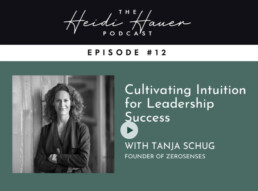
What inspired me recently: The Art Of Letting Go
I have recently been thinking about the end product of artistic creation: the artwork itself. I realized that often, what we admire as art is something that no longer has any meaning for the artist himself. The visible art piece is an expression of a moment of creation that emerged from a development process. Once you begin to flow with this rhythm, you do not stop to appreciate the beautiful end product, you continue to grow. Radically formulated, art can be considered a by-product of emotional and personal development. While we are still admiring and appreciating the “skin” he has shed, the artist is already one step ahead.
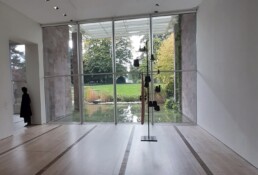
In the business world, it is often the other way round: letting go is difficult. Once you have “created” something, you want to preserve it. You know all too well how much energy has gone into the company, the product or the team you have developed or created.
Here you can look to the art world for inspiration: The white canvas - the emptiness that represents a new beginning - can also be seen as the space of potential. The moment to dare to try something new is the white canvas and the first step, like the first brush stroke, is the most difficult of all.Erik Brynjolfsson, a professor at Stanford University, once said in a lecture:
"Sometimes you have to kill your darlings"
Some situations require the art of letting go, and Brynjolfsson believes that it is only then that truly great things come into being. This is not meant to be an invitation to let go of everything that is dear to you, but encouragement to consider what you may be compulsively holding on to and what may be keeping you from making the first brushstroke on the next white canvas. Just ask yourself: What is the worst that can happen when you start a new brushstroke? Nothing really bad, you might think. Well, why not try then?
Thank you for joining me for this episode of the Letter of Inspiration! Feel free to share this letter with colleagues and friends.

Share
#7 Letter of Inspiration - Standstill

In this episode of my Letter of Inspiration, I talk about the current cocktail of tiredness and fear that is accompanying us, about the role played by the right impulses in getting us moving again, and how refreshingly flexible thinking can be. Enjoy!
If you’re standing still, you aren’t moving.
The summer has shown itself once again in all its glory. Besides abundant joy, it also brought complaints: just as summer vacations are drawing to a close, the hustle and bustle here in Zurich is beginning to pick up speed and intensity again. Meanwhile, the warm weather has a paralyzing effect and makes us lethargic. Thinking becomes more difficult and the call of Lake Zurich for a cooling dip becomes louder. On one hand, we are tired because of the heat, and on the other hand, we are afraid of the insecurity of a second wave—a combination that probably would have been called "dangerous" in a history book. If the forecasts are right, we in the business world are heading for something that would be optimistically described as a major change, and in ordinary speech as a crisis. So how do we change history and float out of the vortex of paralyzing fatigue and fear of the future?
"In a ship in stormy seas, he who stands still and does not move falls over."
Ludwig Börne, German writer
What has announced itself the last decades, is in no small measure the consequence of unlimited availability, which has led to excessive consumption, much like a child left in a candy store unattended. In the post-war period this was legitimate: people enjoyed access to that which harsh circumstances had denied them. Enjoyment and wastefulness both contribute to economic growth. But do we still appreciate this luxury today, and are we indeed entitled to it?
Read my published article on the topic: "Luxury as a Discontinued Model"
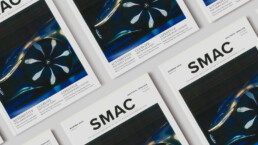
We have grown up surrounded by luxury goods, and it has become infinitely accessible through digitalization and groundbreaking inventions like smartphones. When something is constantly available, it is only human to eventually take it for granted. However, months in isolation make me wonder whether it is still appropriate to take the time to indulge in luxury. Not because it is no longer attractive, but rather because it does not help. Nothing can develop when we remain static. To trigger a reaction, movement is needed—as you already know from Physics 101. And that is also what we need now: movement.
What is the accelerator of our time?
A still incalculable risk hovers over our near future. Coupled with fatigue and fear, this results in a cocktail that would make even James Bond falter. After the Second World War, the ZERO art movement broke through the canvas as an artistic expression of a new beginning, a physical act that released new energy for creation. However, movement does not always have to be physical. Emotions are often described as "I am moved by something". Is it possible to break through the apparent dreariness of exhaustion and anxiety by acting on one's emotions, and what can that look like?
Discovering your own passion
Passion is more than just a job description, it can be found in living according to your values and moral convictions. In addition, what you enjoy doing is not perceived as "work". The popular German philosopher, Markus Gabriel, writes in his current book about "moral progress in dark times" about his insights on a new form of cooperation, one which Gabriel claims is already noticeable in some areas of society, and that he believes will continue to grow. What can this look like?
A few years ago, the term "gig economy" was coined. Young talents who were clearly aware of their skills would immerse themselves in start-ups or companies for short-term contracts to contribute their knowledge over a period of 6 to 12 months. What is now emerging is a wave of freelancers who, like the gig workers, are very clear about what they have to offer. When I hear Markus Gabriel talking about new cooperations, I have a bigger picture in mind of something that will dissolve existing hierarchical company structures and lead to something new on a project-based, talent-oriented and independent basis. Breaking down the big picture into small parts makes it possible to move with more agility and, above all, to correct shortcomings at their source more quickly and with more control over their effects. For managers this means several things: How do I enable my employees to recognize their own strengths? How can I enable personal responsibility? And how can I stand back and let my team create something new? How can I be happy about failures and not judge them? How do I create an environment that allows my employees freedom within the organization?
"It is not the strongest species that survives, nor the most intelligent, but the one that is most likely to adapt to change.”
-Charles Darwin, British naturalist.
If stagnation is not an option, then we must allow for and encourage movement. One way is to seek out new impulses and perspectives that open your eyes to new ways and ideas. These can be found in the stories of the people around you: all it takes is your active listening. I had the privilege to hear such a “behind-the-scenes” story the other day, and have written it down for you: that of a man who trusts in his path and says that he has never felt better since the moment he followed his intuition.
What has inspired me recently?
In order to avoid the notorious second wave, many concert promoters have decided to cancel summer festivals. In Switzerland, health regulations are too restrictive to allow for the usual festival scene. But who says that there has to be a usual one? In this special situation, we need to be flexible in our thinking. It's not a matter of keeping everything the same, but of how you can unfold in a new setting.
One example that is very close to my own heart is the Festival da Jazz in St. Moritz, which this summer reluctantly had to give up its main stage, the legendary Dracula Club. The main aspect of this place is proximity between audience and performers, since it has no stage. So a new main venue had to be found, and together with the unique Grand Hotels onsite and their magnificent ballrooms, new venues were created that met the standards of the health authorities.
It may seem like a lone standout, like the small Gaulish village of Asterix and Obelix. However, it is not about rebelling, but rather about preserving a cultural asset while at the same time allowing for new thinking. This requires courage and openness to leave the familiar behind and yes, probably a few Gauls with a similar mindset. What has just happened in St. Moritz on a small scale can be a model for many entrepreneurs who find themselves in a situation where "the old way doesn’t work anymore". The good news is: it does, just differently.
On my own behalf...
If you enjoyed reading this, make sure to pick up a copy of Die Welt on Monday, August 31! There will be a big interview with me about the future of society and the business world. If you missed to get your copy, you can find the interview online.
Thank you for joining me for this episode of the Letter of Inspiration. Feel free to share this letter with colleagues and friends.

Share
#6 Letter of Inspiration - What now? Action?

In Switzerland, slowly we are awakening from a state of hibernation. In this issue of my Letter of Inspiration you will find thoughts on how to use the void between stillness and re-start, why the medieval poet Dante plays a role in this, and what Microsoft CEO, Satya Nadella, has to do with the term "New Humility". Enjoy reading.
What now - Action?
The lockdown put basically the world in a kind of "hibernation". This with the only difference that we were fully awake with a clear mind during this hibernation. If one observed the reactions in society, two groups surfaced: the activists and the paralyzed. Even though we are not trained for an exceptional situation like this, the one part tried to continue its great drive for action, the other part was paralyzed by the wave of uncertainty.
We cannot yet fully imagine the economic damage caused by this pandemic. What is visible, however, are the health consequences. The virus claims victims, but the so-called lockdown also has a major impact on the mental health and well-being of many individuals.
The isolation is slowly being lifted, but everyday life suddenly seems like a visit to the zoo: Normally thick glass screens or fences protects us from the wild animals - now it is gloves, masks and a minimum safety distance of 2 meters which is supposed to protect us from an invisible danger.
Loss of Closeness
Can business relationships be maintained remotely or is there a risk of developing a similar relationship with our partners as with the animals in the zoo (i.e. none)? Distance cannot simply be resolved digitally. It makes "survival" easier for us, but life in digitality has its limits. Especially when it comes to the human factor. Through the forced reduction of our sensory perception in those digital interactions we are currently losing something that is essential: our intuition.
Rethinking the Existing
Of course, the current situation makes me wonder whether, with all these serious events, and times of lockdown and despair allow us to address intuition and the sharpening of perception. I believe that right now the subject of intuition is more important than ever. Not only does the lockdown confront almost all of us with an increased awareness about (the changes in) ourselves, our lives, our fears, nature, the world around us and our interactions. Fortunately there are people who are not in poor health or seriously affected economically. Doers who are used to acting, they too are caught in this empty state between stagnation and progress and have a right to speak and receive positive thoughts.
I would place these people in a third group, alongside the activists and the paralyzed: the considered. They use the void moment, between stagnation and progress, and reflect. It wouldn't surprise me if insights were to emerge in the process that question the unstoppable hunger for continuous growth, for consumption of goods, but also I believe the relationships and communication between fellow human-beings will be questioned. Do you really have to attend every meeting in person? Or to every company apéro or summit? And does it need the new "whatever"? Reflection increases the awareness of scarcity of our time and how to make the best use of it. Suddenly it is all about powerful conversations which stimulate and activate you. Rather less, but a valuable exchange. Not just any conversation, but one that matters for you or triggers something in you.
Rest, Reflection, New Beginning.
So, we have rested, gathered our thoughts and are ready to start again. What should we look forward to? Developing together will be essential in the phase to come because if times of crisis are good for anything, it's for reflecting about our own strengths. And this also shows where we need trustworthy supporters.
Existing concepts for success must now likely be reconsidered for most of us and translated into the new context in which we are finding ourselves. However, new thoughts do not emerge in familiar surroundings or in one's own comfort zone, but rather in a controversial exchange with people from other disciplines and idustriers. If you open your eyes, inspiration from other industries can reach you. Whether it is in the creative process of designers who process the current situation in their product variations, or the creativity with which restaurants have reacted to the lockdown. These impulses can be inspiration for you or translated into your own business.
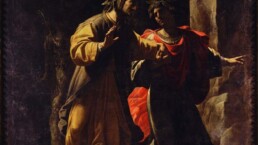
It is no coincidence that the medieval poet Dante Alighieri was accompanied by a trusted friend on his way from “hell to paradise”. In Dante's case this was Virgil. Virgil was a faithful companion, who listened to Dante and guided him. Virgil symbolizes Dante's "intuition". This pandemic was unforeseeable and its size and consequences are still uncertain. That we feel uncertainty is okay, but you don't have to go through it alone. Whereas we are all in the same situation, it is possible to let go of the ego-centeredness and allow others to be involved. That was the moment when Dante met Virgil; an interlocutor who listened, who together with Dante found deep clarity on the core issues, sharpened Dante’s intuition and pointed out paths of action to master the way from "hell to paradise". Virgil - the intuition - is an underestimated weapon in the moments of crisis, which is worth (re-)activating.
The good news is that intuition can be developed and strengthened. We have already begun the journey from hell to paradise. We will only take this demanding and unknown path by opening our own perspective and give space to new thoughts. One carries the thought buds for this within oneself; to let them blossom, one needs the right impulses. The curating of such impulses is my core business and can be seen in events like the Zero Senses Retreat or in individual accompaniment. In 2 ½ days, the retreat format offers natural leaders a firework of impulses from other areas and creates a bridge to application in their own everyday work. The next event will take place in autumn and you can register here for further details.
What has inspired me recently: New humility
Sustainability will probably be named as the “non-word of the year” soon. Every entrepreneur, but also almost all friends have the same opinion "Yes, we have to do something...". There are wild ideas on how to implement sustainable aspects in companies and ultimately in our life. One strives for an ISO certification for his company, the other buys only regional products, while another refrains from flying within the EU, but enjoys his avocado toast every morning (by the way, anyone wondered how avocados get from Mexico to Switzerland?). I was lucky enough to experience what sustainability means in holistic terms, when I temporarily lived in the Netherlands a few months ago.
Obviously, the consequences of climate change will directly affect cities like Amsterdam, which lie below sea level. Although I am convinced, that this is not the only reason, this country is closely connected to nature and the fate of the latter. It is apparent in their holistic approach through emobility, the generally healthy lifestyle, and an amazingly high number of impact startups and sustainable food concepts.
Jack Bean, a vegan fast food start-up: One of the founders, a star chef from Rotterdam, wanted to prove the fact that vegan food tastes good, easy to make and sustainable to produce. This young team uses only products grown in the region (i.e., no avocado or quinoa). They have a digital ordering process via tablets and tableware from renewable materials. Their target group are men who want to eat healthily, without giving up on taste. Of course, Jack Bean offers home delivery too, but only by bike or e-scooter and in recyclable boxes. A holistic concept with a great potential.
With this, my Letter of Inspiration comes to an end… Thank you for joining me on the way to more clarity. If you like this episode, please feel free to share it with like-minded colleagues and friends, encouraging them to subscribe!

Share

